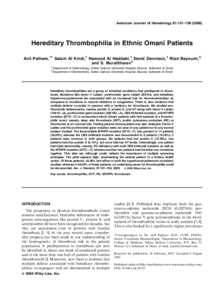Document
Hereditary thrombophilia in ethnic Omani patients.
Identifier
DOI: 10.1002/ajh.20525
Source
American Journal of Hematology. v. 81, 2, p. 101-106
Contributors
Al-Kindi, Salam., Author
Al-Haddabi, Hamood., Author
Dennison, David., Author
Bayoumi, Riad., Author
Muralitharan, S., Author
Country
United Kingdom.
City
London.
Publisher
Wiley
Gregorian
2006-02-01
Language
English
English abstract
Hereditary thrombophilias are a group of inherited conditions that predispose to thrombosis. Mutations like factor V Leiden, prothrombin gene variant 20210A, and hereditary hyperhomocysteinemia are associated with an increased risk for thromboembolism as compared to mutations in natural inhibitors of coagulation. There is also evidence that multiple defects co-exists in persons with a tendency for thrombosis. We studied prothrombotic determinants, namely protein C, protein S, and AT along with factor V Leiden (1691 G→A), prothrombin gene mutation (20210G→A), CBS 844ins68 mutation, and MTHFR mutation (677C→T) in consecutive ethnic Omani patients with first episode of a thrombophilic event, namely, deep vein thrombosis (DVT), and/or pulmonary embolism (PE) or thrombosis at an unusual site. Fasting plasma homocysteine was also analyzed. Factor V Leiden and the prothrombin gene mutation were not seen in any patient nor in any control subject studied. The thermolabile MTHFR mutation (677C→T) was present in 14 patients (35.89%) whereas the CBS 844ins68 mutation was documented in 6 patients (15.38%); 3 patients were common in both groups. Six patients had low protein C (15.38%), two patients had low protein S (5.12%), but none had low AT levels. Interestingly, one patient had triple abnormality, namely, PC deficiency with both CBS 844ins68 mutation as well as the MTHFR mutation (677C→T) whereas another two patients had the latter two mutations together. This data set, although small, reflects the importance of multiple screening strategies. The yield appears high, emphasizing the referral pattern to a tertiary health center. Of these patients, 43.58% had either or both the hyperhomocysteinemic mutations studied, whereas in 38.46% of these patients, no underlying cause for thrombophilia could be documented.
ISSN
0361-8609
Resource URL
Category
Journal articles

